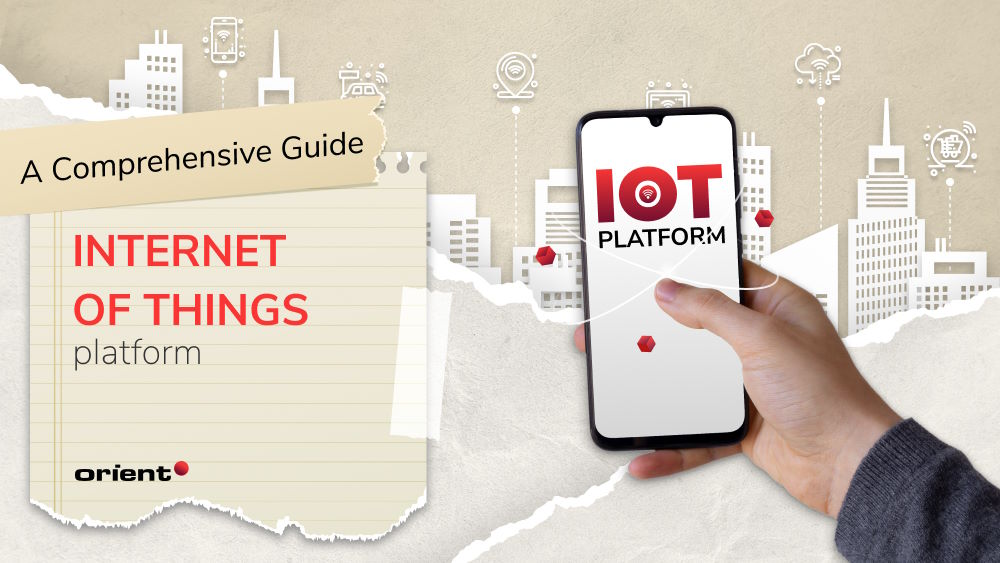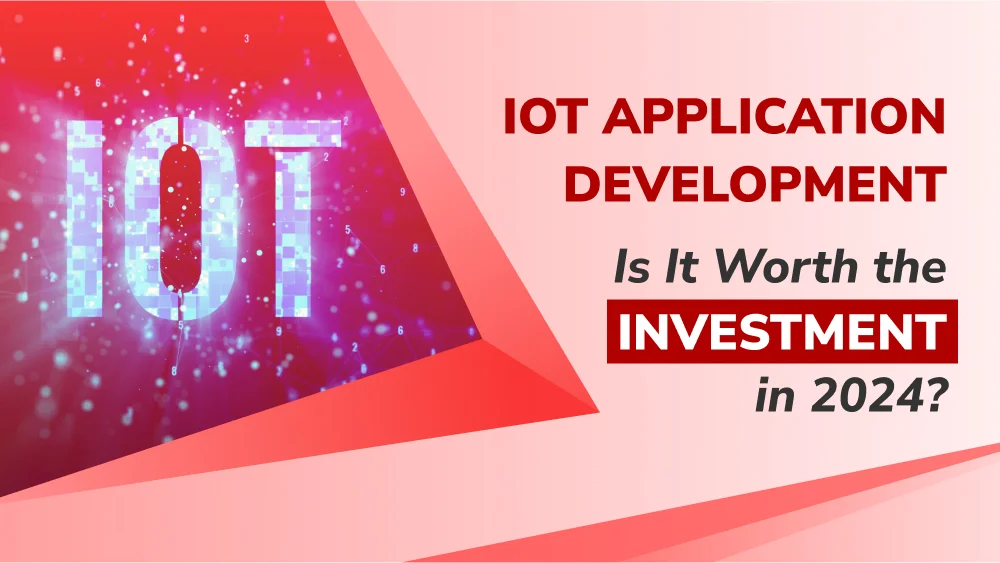Internet of Things Platforms: A Comprehensive Guide

Content Map
More chaptersDid you know that the number of devices connected to the internet has reportedly risen to over 15 billion? Yes, you heard it right. 15 billion. By 2030, the number is expected to be close to 30 billion.
All these devices are part of the Internet of Things (IoT) - a term coined by Kevin Ahston in 1999. By 2013, the term was officially added to the Oxford Dictionary. From then on, IoT has only grown larger and has become a frequently used technology in many industries. This has been made possible thanks to the Internet of Things platforms.
What exactly is an Internet of Things platform? This article will act as a step-by-step guide to help you better understand this term.
What Is an IoT Platform?

To fully understand what IoT platforms are, you need first to understand what IoT, or the Internet of Things, means. In short, it is the idea to connect any device to the network and to other connected devices. It is a large network of interconnected devices, people, and even animals. Data on how these devices are used, and their surroundings are collected and shared.
IoT app development platforms are on-premises software packages or cloud services (IoT platform as a service or PaaS). These platforms are made to accommodate numerous smaller application programs that address business issues. It consists of a variety of functions, such as an operating system, development tools, storage, processing power, and security, and might even control numerous types of endpoints.
IoT platforms are designed to support IoT applications and other digital business activities.
A Deep Dive into IoT Platforms

How Do They Work?
Internet of Things platforms acts as a bridge connecting the hardware and the many application layers. Its function involves device management, remote device configuration and control, and extracting data from a massive number of endpoints - which do not always have the best connections or locations.
More often than not, the best IoT platform is expected to meet the following criteria:
- Support integration with any connected device.
- Facilitate third-party apps used by the IoT device.
This allows the device to be functional in IoT ecosystems. Again, one effective IoT platform should be able to handle most, if not all, types of IoT devices thanks to its independence from underlying hardware and overarching software.
Benefits of IoT Platforms
As you can already imagine, IoT platforms bring about a huge number of advantages. The main purpose of any IoT platform is to help developers, users, and service providers with issues relating to:
- Data Management: IoT platforms manage the enormous data flow between applications. The data might come from devices or sensors in traditional CRM or ERP systems.
- Cloud Center: Cloud computing is crucial to IoT applications. A growing number of businesses are relying on hosted computing and data storage. Some notable cloud platforms include Google and Microsoft.
- Application Enablement: This function allows developers to prototype, create, integrate, and manage IoT applications quickly and effectively. Application enablement platforms (AEP) often are part of a larger IoT platform. This solution offers businesses a quick way to deploy applications and solutions without causing any major disruptions to the existing IT infrastructure.
- Device Management: As the name suggests, this refers to the process of setting up, keeping track of, and maintaining connected devices in an IoT environment.
In short, an effective IoT platform reduces the complexity of the mentioned tasks as much as possible.
Do keep in mind that most IoT applications share many, if not most, underlying functionality. This is a large reason why platforms are so beneficial - the core technology is the same for most IoT applications; it doesn’t matter if it’s related to supply chain management or remote management for your workforce. Hence, developers are given the time and space to focus on solving the unique problems of the very industry involved.
All in all, a good IoT platform saves up a lot of costs, time, and risks relating to application development and maintenance.
IoT Platforms Challenges
Every technology has its pros and cons, as well as its challenges. IoT platforms are not an exception.
General Management
IoT platforms do not only manage data and devices. This technology is also required to comply with certain standards and regulations, namely messaging and industrial protocols. However, there are many rules to follow, which makes the management already more complex than it already is.
In addition, not all ecosystems are consistent, and it is occasionally necessary to alter the basic business procedures. A lack of experience in creating IoT products, services, or devices might make this difficult.
Optimizing Collected Data
With the huge volume of data generated today, optimizing data has also become a problem for IoT platforms. Data management and data processing are difficult since there are billions of connected devices and sensors producing seas of data every day. This also involves other aspects regarding data optimization, such as its volume, velocity, analytics, diversity, etc.
Data Security and Privacy
The recent years have experienced an ongoing debate about data security and privacy.
Many large organizations have lost their customers’ trust due to the theft or leakage of sensitive information and data.
When an inadequate IoT platform loses data, it leads to a loss of productivity since the system is not working as it is supposed to or even poses a danger to a worker’s safety. This may even cause problems relating to compliance with regulations and laws.
Therefore, security must be ensured for data in use (on a device), data in motion (data traveling across data networks), and data at rest (data that has been saved).
How Should You Go About Choosing a Suitable IoT Platform?

Just like many technologies out there, you might already be aware by this point that there is no one IoT platform with the ability to cover every single need and feature. Hence, it helps to first start with you and your own business: What are your needs when it comes to IoT platforms? What are your strategies? What are you and your team trying to achieve?
Do keep in mind that there are a number of different IoT platform categories:
- IoT cloud platforms (a.k.a. application enablement platforms)
- IoT connectivity platforms
- IoT device platforms
- IoT analytics platforms
When considering a platform that would best fit your organization, pay attention to the following:
- Your Partner’s Credibility: IoT in itself brings about a lot of risks. Make sure your partner has experience and is reputable. Check for other clients’ testimonials if possible.
- Applications Environment: No one understands your business better than you do. Make sure to confirm with your in-house developer team or partner that the application-development environment does not cause any unwanted disruption and is compatible. Furthermore, take into account the following factors: The standard enterprise application interfaces, pre-installed apps, and the integrated development environment.
- IoT Data Security: How would you like to store your data, on-premises or in a public cloud? Are there any specific regulations or precautions? Who has access to your IoT data? Are there any encryptions or authentication needed?
- Broad Ecosystem: IoT in nature is already so massive that it is hard to imagine the full control of one single enterprise. Look for scalability and flexibility in your chosen partner, who also has a strong partner ecosystem. It is always a positive sign when your IoT supplier has a partner that manufactures IoT hardware devices instead of doing it themselves.
- Seamless Onboarding: Taking on a new platform is never easy - this is also why a lot of companies stick to known platforms for years. Choose a partner that has an effective onboarding process, like training your team and guiding you through the initial phases.
A Quick Review of the Best Platforms in the Market
Now that we have covered everything you need to know about IoT platforms, let’s take a look at the top IoT platform suppliers in the market.
Microsoft Azure IoT Suite
Microsoft Azure IoT hub provides its users with adaptable applications that meet the demands of your business using ready-to-use tools, templates, and services. Some notable features include: AI solutions, offline mode with Azure IoT Edge, data protection, seamless integration with other Azure services, and the list goes on.
IBM Watson IoT
IBM Watson IoT is a fully managed cloud service for device management. The platform provides users with powerful built-in web dashboards, data analytics services to process raw metrics, long-term data storage with the Cloud Object Storage solution, etc.
Google Cloud Platform
Currently one of the top players in the field, the Google Cloud platform offers you an array of value functions, which allows you to have real-time data analytics, data visualization in the form of reports or dashboards, AI and ML features, location tracking, and so on.
Cisco IoT Cloud Connect
Cisco IoT Cloud Connect is another reliable IoT platform worth considering. Their end-to-end IoT solutions offer connectivity management, industrial sensors, edge computing, network connectivity, cybersecurity, domain expertise, etc.
Other popular IoT platforms worth your attention include Salesforce IoT Cloud, IRI Voracity, and the Blynk IoT platform.
Last Note
Working on an IoT solution is truly complex. Thus, it is always a good idea to get help from those who know what they are doing. Do keep in mind that the IoT market is rather immature, and there are no universal standards yet. Start slow and easy with the help of reliable experts like the Orient Software team.
Getting started with IoT platforms might be scary at first, but it is definitely worth it in the long run.







